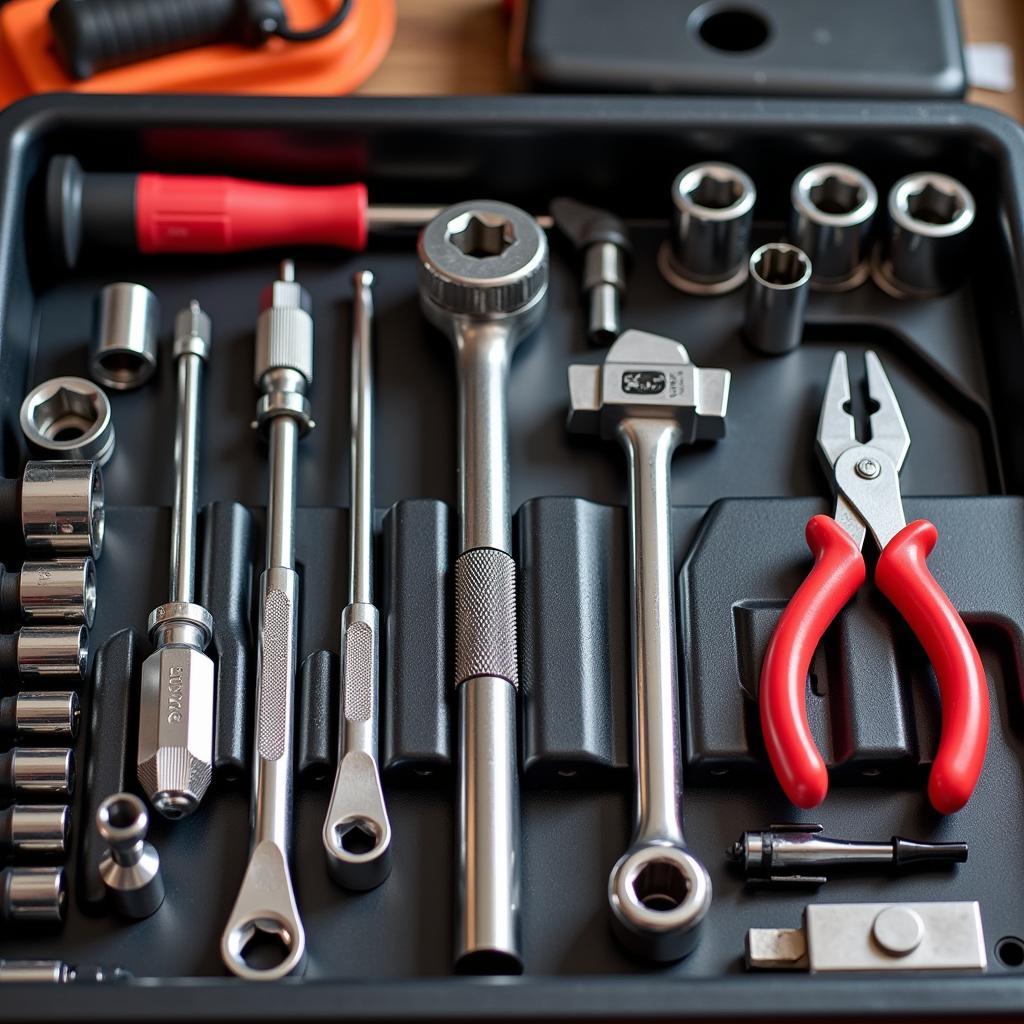Working on your own car can be incredibly rewarding, saving you money and giving you a sense of accomplishment. But before you dive under the hood, you need the right tools. This guide will help you determine What Tools Should I Buy To Work On My Car, covering everything from basic maintenance to more advanced repairs.
Essential Hand Tools for Any Car Enthusiast
Every car owner should have a basic set of hand tools for simple tasks like changing a tire or replacing a battery. These tools are relatively inexpensive and can save you a trip to the mechanic for minor issues. A good starting point includes:
- Screwdrivers: A set of both Phillips and flathead screwdrivers in various sizes is crucial. You’ll use these for everything from tightening loose screws to prying open panels.
- Wrenches: A combination wrench set (with both open and box ends) in both metric and standard sizes is essential for removing and tightening nuts and bolts.
- Pliers: Needle-nose pliers are perfect for reaching tight spaces, while slip-joint pliers are great for gripping larger objects.
- Socket Set: A socket set with a ratchet, extensions, and various socket sizes will make removing and installing nuts and bolts much easier, especially in confined areas.
- Torque Wrench: This tool is crucial for tightening bolts to the correct specification, preventing damage to your car’s components.
 Essential Hand Tools for Car Maintenance
Essential Hand Tools for Car Maintenance
Choosing the right tools can be challenging. Check out our comparison guide to help you make the best decision: compare buying car tool.
Diagnostic Tools for Troubleshooting Car Problems
As cars become increasingly complex, diagnostic tools are becoming more important than ever. These tools allow you to pinpoint the source of problems quickly and efficiently, saving you valuable time and money. Some essential diagnostic tools include:
- OBD-II Scanner: This tool plugs into your car’s diagnostic port and can read error codes, providing valuable insights into the cause of various issues.
- Multimeter: A multimeter measures voltage, current, and resistance, allowing you to test electrical components and diagnose wiring problems.
- Test Light: This simple tool can help you determine if a circuit is live or dead, making it useful for troubleshooting electrical issues.
If you’re looking for specific tools to remove your car radio, this guide might be helpful: how to remove a car radio without din tools.
Specialized Tools for Specific Repairs
Depending on the type of work you plan on doing, you may need some specialized tools. For example, if you plan on working on your car’s brakes, you’ll need a brake bleeder kit and possibly a caliper compression tool. Similarly, if you’re going to change your oil, you’ll need an oil filter wrench and a drain pan.
- Jack and Jack Stands: These are essential for lifting your car safely off the ground for tasks like changing tires, rotating tires, or working on the brakes.
- Creeper: A creeper allows you to comfortably work under your car without straining your back.
“Investing in the right tools can save you money in the long run,” says John Miller, a seasoned automotive technician. “It allows you to tackle many repairs yourself, avoiding costly mechanic bills.”
For a more comprehensive list of mechanic tools, check out this resource: mechanic tools for cars. Also, a car fuse puller tool can be incredibly handy: car fuse puller tool.
Conclusion
Knowing what tools should I buy to work on my car depends largely on your mechanical skills and the types of repairs you intend to undertake. Start with a basic set of hand tools and gradually expand your collection as you gain experience and tackle more complex projects. Remember, having the right tools can empower you to maintain and repair your car effectively, saving you money and providing a sense of satisfaction.
FAQ
- What is the most important tool for a beginner? A good set of screwdrivers and wrenches is a great starting point.
- Do I need metric and standard tools? Yes, most cars use a combination of both.
- What is an OBD-II scanner used for? It reads diagnostic trouble codes, helping you pinpoint car problems.
- Are specialized tools necessary? Yes, for specific tasks like brake repair or oil changes.
- Where can I find reliable car tools? Reputable auto parts stores and online retailers are good options.
Tools for fixing scratches on a car can be found here: tools for fixing scratches on a car.
Need help with your car diagnostics? Contact us via WhatsApp: +1(641)206-8880, Email: [email protected] or visit us at 910 Cedar Lane, Chicago, IL 60605, USA. Our 24/7 customer support team is ready to assist you.

Leave a Reply